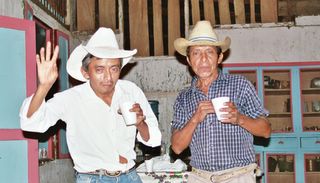My professors regularly reinforce in me and the other students, temperence and moderation in respect to an anthropologist's inner desire to "help." It is certainly true that the only things that stick will be things that come out of their own agency. But still, before any new initiatives in Chocola can begin, there is a tremendous amount of legwork that needs to be completed, to quantify the demographic and economic status quo. Campesinos who spend 4/5ths of their day working in order to feed their families just don't have the time for things like this.


If anyone is to help Chocolenses help themselves, this is the first order of business; The second then, is theoretically where I come in, is to establish an ethnographic understanding of the K’iche Maya of Chocolá. Of particular interest to such a study is coming to understand the K’iche cultural space, and how the Maya might construct, maintain, and leverage their identity within a globally oriented market of agribusiness and tourism.
A Nearby Success Story?
The Kaqchikel Maya street vendors that work popular tourist stops such as Antigua and Panajachel display an intriguing example of identity management that has embraced change while allowing the essence of their identity to thrive. They have and continue to face many social, political and economic issues that await the Chocolenses, should they decide to turn to tourism as a new subsistence activity. As such their experiences will likely provide invaluable insight. These vendors are Maya that did not have to enter the tourism market, but have nonetheless, and have done so in calculated ways: “incorporating themselves into the global while continuing to reinscribe significance in the local.”
Of particular interest is how the women of these Kaqchikel families are actively remaking their cultural space, emerging as a recognizable icon of Guatemala and modern Maya cu lture. Generic family structure is consistent between the Kaqchikel and K’iche; though the eldest male carries the highest level of status in a family, there is little to no power differential between women and men. In Chocolá, it remains to be seen how powerful women might too remake themselves and thereby help their community better face new global influences and greater economic diversity.

